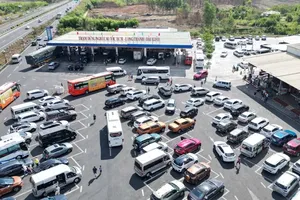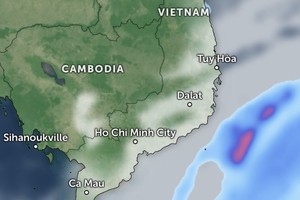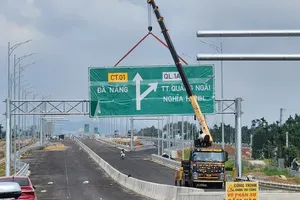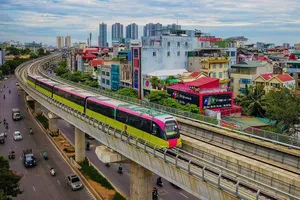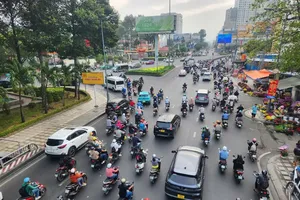Deputy Prime Minister Le Minh Khai has recently signed Decision No. 1162, allocating an additional VND4 trillion (nearly US$164 million) from the Central budget reserve in 2023 for localities in the Mekong Delta to implement prevention projects. Despite urgent deployment by local authorities, landslides in the Mekong Delta remain alarming.
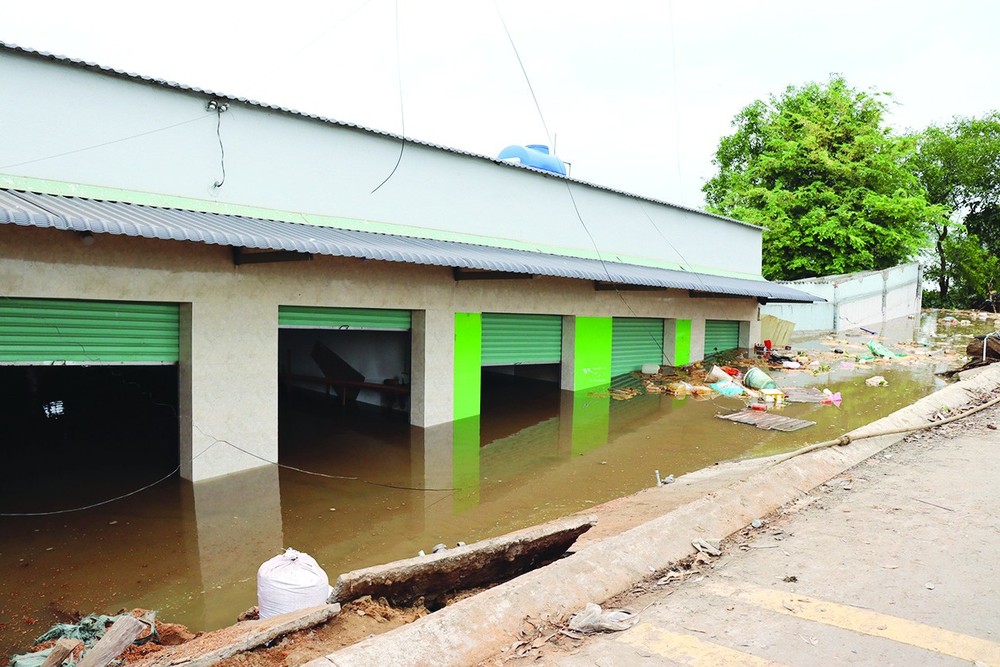 |
| Landslides along the riverbank of Can Giuoc River in Long An Province sweep away and collapse numerous houses. (Photo: SGGP) |
Coastlines, riverbanks, and canals in ruins
In recent times, Ca Mau Province has invested over VND2 trillion in constructing 55.7km of coastal protection embankments and 9.2km of riverbank dykes to prevent landslides. However, the local government and residents remain concerned as landslides persist, becoming increasingly serious.
According to observations by SGGP reporters in early November 2023, the coastline from Bo De sea gate to Hoc Nang sea gate in Tam Giang Tay Commune, Ngoc Hien District (Ca Mau Province), continues to experience severe landslides, creating deep furrows into the mainland for tens of meters. Along this coastal area, tall-stilt mangroves and Avicennia are uprooted and scattered due to the force of the waves. To avoid danger, many households living about 100 meters from the coastline have relocated their belongings elsewhere, leaving only empty houses.
Mr. Nguyen Van Phuc, one of the few residents still staying in this area, said that after harvesting the shrimp crop, his family will also move away. Last week, two houses were washed away by water, luckily the owners had already moved to another place.
According to the Ca Mau Provincial People's Committee, being surrounded by the sea on three sides, Ca Mau is heavily affected by climate change, rising sea levels, and extreme weather conditions. Along the Eastern coast of Ca Mau, the average landslide rate is about 45 meters per year, with 29 kilometers of extremely dangerous landslides and 40 kilometers of dangerous landslides; while on the Western coast, there are 22 kilometers of dangerous landslides.
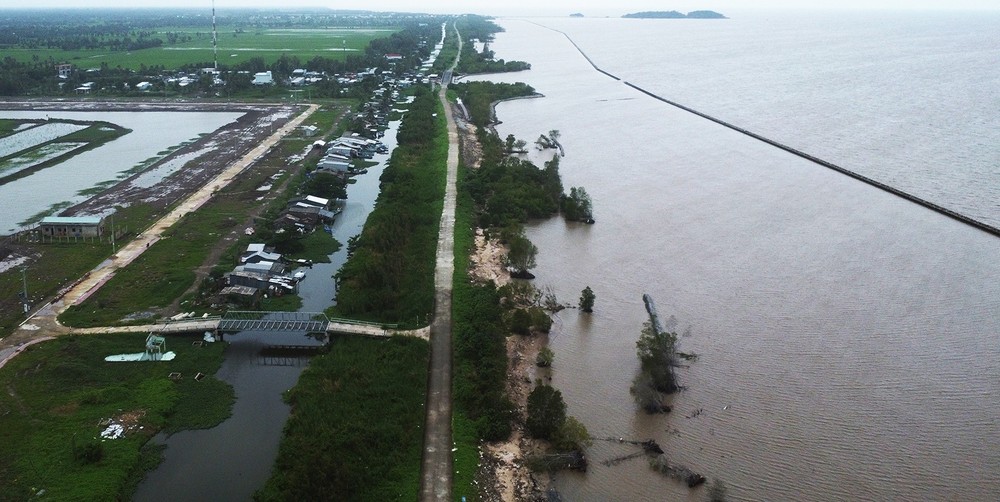 |
| The Western coast of Ca Mau province has been heavily affected by landslides. (Photo: SGGP) |
In Ben Tre Province, a nearly 5-kilometer stretch of coastline in Bao Thuan Commune (Ba Tri District) has been continuously eroding recently. So far, in this area, four houses have completely collapsed, and 11 houses have been damaged. Landslides have also completely damaged 100 meters of concrete road, and 650 meters of embankment, and destroyed 16 hectares of protective forest and 45 hectares of flower fields. More worrisome is the imminent risk of severe landslides, threatening the lives of 115 households and affecting 535 hectares of land.
Faced with this reality, on October 30, Chairman of the Ben Tre Provincial People's Committee Tran Ngoc Tam, had to issue a decision declaring an emergency of landslides and coastal erosion in Ba Tri district to find appropriate solutions.
Similarly, the situation of riverbank landslides in the Mekong Delta is also a cause for concern. In Cai Be District (Tien Giang Province), from the beginning of 2023 until now, there have been 41 new landslide locations, posing a threat to the lives of thousands of households. Most of these landslide locations are concentrated along Canal 28 in the communes of Dong Hoa Hiep, Hau Thanh, and Hau My Phu.
Concerning the section of riverbank affected by landslides encroaching on the adjacent road, Mr. Hanh, a resident of An Thanh Hamlet in Dong Hoa Hiep Commune, expresses that every time a vehicle passes by, he gets anxious because the riverbank is eroding beneath the road, and the road surface, which could collapse at any moment.
According to the People's Committee of Cai Be District, the total length of Canal 28 affected by landslides is 3,760 meters, affecting 1,350 households.
A representative of the People's Committee of Cai Be District said that in recent times, the local authorities have used concrete pillars to shore up the road surface at landslide locations. However, this is only a temporary solution. In the long term, the implementation of a riverbank landslide prevention project is needed, but due to the limited local budget, it has not been possible.
In Long An Province, the provincial People's Committee has just declared an emergency of landslides along the Vam Co Tay riverbank and the Ca Ro Canal, in Kien Tuong Town. The two landslide locations have a total length of about 2,449m, posing a threat to the safety, property, infrastructure, and homes of hundreds of households in the area.
The cause of the landslides is attributed to the area being heavily affected by annual floods, combined with weak soil. The local authorities are currently mobilizing residents in the landslide-prone area to proactively relocate their homes, property, and goods to a safe place.
The People's Committee of Long An Province has also instructed the Department of Agriculture and Rural Development to coordinate with the People's Committee of Kien Tuong Town to review and update the situation in the sliding belt, coordinate with relevant units to monitor and delineate the extremely dangerous landslide areas, construct safety corridors, and prevent serious consequences.
Immediate use of additional VND4 trillion from the government
Mr. Nguyen Dam Thanh Tuyen, Director of the project management board for investment in the construction of agricultural and rural projects in Tien Giang Province, stated that the unit is currently completing procedures to invest in addressing serious landslide locations along Canal 28 using the VND200 billion allocated by the central government in 2023. Specifically, Tien Giang Province will invest in dyke construction to prevent landslides at 8 points in Dong Hoa Hiep Commune, 1 point in Hau Thanh Commune, and 1 point in Thien Trung Commune in Cai Be District. These are the most seriously affected landslide points along both banks of Canal 28.
Mr. Tuyen said that when the central Government recently allocated funds from the VND4 trillion package, the project management board expedited the implementation of procedures and started construction in 2023. The project is expected to be completed in 2024, in line with the central government's guidance and the wishes of the people.
With the recent VND200 billion from the government, the People's Committee of Hau Giang Province will construct dykes to prevent landslides along the Nang Mau Canal in Tan Long Commune, Phung Hiep District with VND150 billion, and the remaining amount will be used to build dykes to prevent landslides along the Lai Hieu canal in Nga Bay City.
Mr. Truong Canh Tuyen, Permanent Deputy Chairman of the People's Committee of Hau Giang Province, said that these are two urgent projects that have been approved. He said that immediately after receiving the funds, the People's Committee will deploy quickly and effectively to create a safe belt in the landslide-affected area, stabilizing the lives of the people as soon as possible.
From the beginning of 2023 until now, nearly 70 landslide points along riverbanks have occurred in Hau Giang province, with a landslide length of over 1,600 meters and a land area of 10,000 square meters lost. Landslides have increased by 46 points compared to the same period last year.
Earlier, Hau Giang Province received VND400 billion in support from the central Government to implement three dyke construction projects to prevent landslides along the Cai Con riverbank in Chau Thanh District, stabilizing the lives of the people in the disaster-prone area. Hau Giang Provincial People's Committee is currently directing relevant departments, agencies, and localities to seriously implement and ensure the construction and disbursement of funds according to the schedule set by the central Government.
Mr. Nguyen Van Vu Minh, Director of the Department of Agriculture and Rural Development of Dong Thap Province, said that there are many landslide-prone areas in the province. After considering the urgency, the province decided to use VND250 billion from the recent central Government supplemental funds to implement the landslide prevention project along the Ho Cu dyke on the Tien River (near Cao Lanh City) with a length of over 2km. Currently, the Provincial People's Committee has submitted the implementation plan to the Provincial People's Council for approval.
Mr. Minh affirmed that the project will be deployed and put into operation effectively as soon as possible to prevent any negative consequences as noted by the Prime Minister.
Priority for long-term landslide prevention solutions
According to the authorities of the localities in the Mekong Delta region, the additional VND4 trillion according to Decision No. 1162 is very practical, contributing to preventing and reducing the consequences of landslides in the near future. However, compared to the increasingly serious landslide situation in the Mekong Delta, the above-mentioned funding only addresses a small part, as landslide prevention projects in the Mekong Delta always require a significant budget.
To reduce costs in landslide prevention efforts, in addition to investing in construction projects, some localities are focusing on resources to plant protective forests along the coast, prioritizing sustainable landslide prevention solutions remotely.
Mr. Le Quoc Anh, Deputy Chairman of the People's Committee of Kien Giang Province, said that in the natural disaster prevention plan, in addition to investing in projects to build wave-breaking dykes, creating sediment, and establishing the west coastline, Kien Giang Province is also planting 644 hectares of new protection forests in coastal areas.
In early October, Kien Giang was allocated VND500 billion from the Government to prevent landslides. This funding will be prioritized by the localities to handle urgent landslide points at the sea gates of Xeo Nhau, Vam Kim Quy in An Minh District, and other locations. According to the plan, after being approved by the Provincial People's Council, the Provincial People's Committee will disburse funds for implementation by the end of this year.


